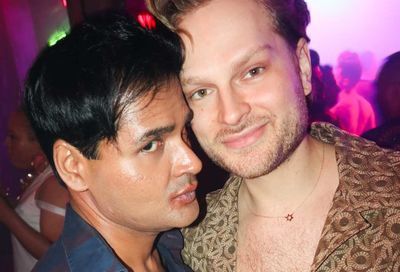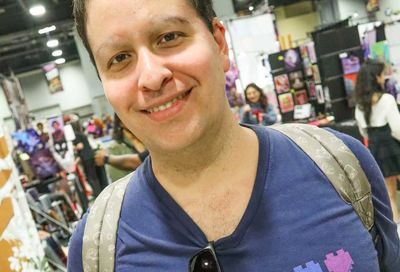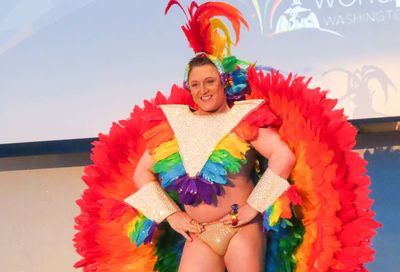Oh, Henry
'My Fair Lady' delivers a good, but not great, theatrical experience, while 'State of the Union' drags at Ford's
It’s good, but it’s not great.
We’re not talking, of course, about the timeless music from Jay Lerner and Frederick Loewe or the original George Bernard Shaw source material. We’re not speaking of Eric Schaeffer’s eccentric, less-is-more approach to a musical theater classic, or of his talented ensemble of Signature Theatre regulars. And we’re not exactly referring to all of the pomp and circumstance that surrounds such a beloved American institution. No, we’re talking about the most memorable vision in any production of My Fair Lady.
We’re talking about the dress.
 |
No matter how streamlined or postmodern or traditional or avant-garde My Fair Lady is presented, it’s still all about that one delectable moment when Miss Eliza Doolittle emerges in high society as a Lady. And in Schaeffer’s unconventional, abstract version — the final show in Signature’s converted garage space before moving to a bigger and better complex in nearby Shirlington — the moment appears a bit vacuous, sterile and, regrettably, unmemorable.
It has less to do with Jenn Miller’s predictable cake-top gown than with our nascent sentiments toward such a lackluster Eliza. Sally Murphy’s spunky Cockney brat isn’t the naïve flower girl first introduced by Julie Andrews and later by a puckish Audrey Hepburn. Here Murphy’s Eliza often comes across as lazy and downright churlish, a simpering fool who isn’t quite likeable, much less irresistible. It’s a wonder how Andrew Long’s cranky Professor Higgins could be so smitten with his belligerent pupil.
But smitten he is, and with Long’s superb interpretation of the persnickety phonetician, My Fair Lady is less about the lady and more about Hank. Consider this version Higgins, the Musical.
Suddenly, Higgins is a compelling character with a story of his very own, an unrepentant misanthrope afraid of his own power. Local audiences already knew that Long is an astonishingly good actor — his terrifying turn earlier this year in Studio’s Frozen could leave no doubt — but the sheer emotional range and complexity exhibited by this Higgins renders Rex Harrison a lamb, a mere amateur to Long’s saucy curmudgeon.
|
Still, even with such a fascinating brute offering up chocolates and linguistics lessons, the chemistry between Higgins and Eliza is notably absent. There is no salient transformation on her part, no intriguing metamorphosis, no tender moments shared between student and teacher. Even more problematic than the lack of chemistry between the two lead characters is that Schaeffer’s bare-bones concept doesn’t translate as minimalist and inspired, it simply seems unfinished.
From a dark and mysterious lighting plot to inexplicably sleeveless tuxedos, Schaeffer’s Lady feels cold and empty, as unpolished and as unready as a workshop production. The exception, of course, is Will Gartshore’s brief appearance as Freddy, the puppydog who croons a sublime ”On the Street Where You Live.” Gartshore’s rich tenor fills the entire theater with robust sound for the first time all evening, the only time you don’t mind the lack of an orchestra (Jenny Cartney’s music direction is limited to two lonely pianos, a sad injustice for such a familiar score).
Aside from a pouty Eliza and the absence of lavish spectacle, Signature’s take on My Fair Lady does offer its fair share of winning moments. Dana Krueger’s snappy Mrs. Higgins and Harry A. Winter’s barely paternal Colonel Pickering are both comic highlights, and a gorgeous array of stunning hats are on display in an expertly staged scene at the horse races. Oh yes, and there’s always that ornery professor at the center of Schaeffer’s project, an odd theatrical experiment that’s good, but never great.
Campaign season is a ripe time for Howard Lindsay and Russel Crouse’s Pulitzer Prize-winning State of the Union, a crispy fried morality play from 1945 currently revived at Ford’s Theatre. The fictional account of a reluctant presidential candidate forced to draw party lines and learn tough lessons ”sometime prior to the Republican presidential nominating convention of 1948,” State of the Union could read as any children’s tale of puppet and puppet master.
Grant Matthews (Jim Abele) is a sharp businessman who has a swell personality and honest-to-goodness passion for the job — after being coaxed into the candidacy by a powerful Washington worm — but not the political savvy to delineate what is possible from what is probable. Battling the dear ideals of his estranged wife Mary (Ellen Karas) versus the cold realities of 1948 politics, Grant must make difficult decisions if he is to ignite a flame on the campaign trail.
|
It’s a long, tiring evening at Ford’s under the direction of Kyle Donnelly, who matches State‘s stiff, stuffy dialogue with droll political advertisements between scenes. Clocking in at almost three hours, Donnelly could have omitted the entire second act and in the end, delivered the same non-message of ”people have the power.” The scenes pick up significantly whenever Christopher Bloch steps on to the stage in a tiny role, but it isn’t until late in the third act that State receives a shot of adrenaline from local thespians Floyd King and Nancy Robinette as a tipsy Southern pair.
Abele and Karas are emotionally siphoned by such bland material, but Karas always manages to turn on the charm, especially in a round of beautiful dresses designed by Wade Laboissonniere. Her unlikely arc is at the wheezing heart of State of the Union, a dusty, dated script that flatlines well before the first intermission.
Support Metro Weekly’s Journalism
These are challenging times for news organizations. And yet it’s crucial we stay active and provide vital resources and information to both our local readers and the world. So won’t you please take a moment and consider supporting Metro Weekly with a membership? For as little as $5 a month, you can help ensure Metro Weekly magazine and MetroWeekly.com remain free, viable resources as we provide the best, most diverse, culturally-resonant LGBTQ coverage in both the D.C. region and around the world. Memberships come with exclusive perks and discounts, your own personal digital delivery of each week’s magazine (and an archive), access to our Member's Lounge when it launches this fall, and exclusive members-only items like Metro Weekly Membership Mugs and Tote Bags! Check out all our membership levels here and please join us today!



















